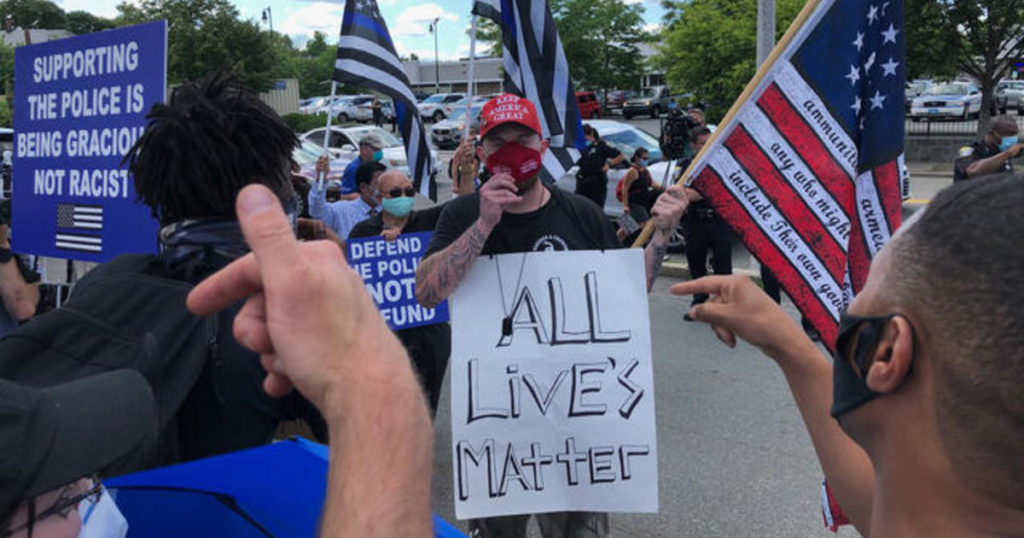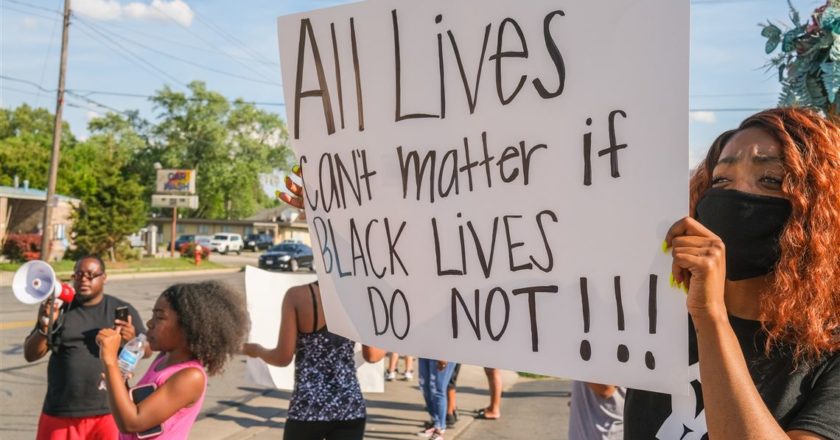Editor’s Note: This article is part of our ongoing process to amplify the voices of our black community and make sure we report on the important issues in our community. Please let us know your thoughts and feedback.
As the “Black Lives Matter” movement spreads across the nation, an increasing degree of backlash has made headway in social discourse. Occasionally, people have started to use the “All Lives Matter” argument as a counterclaim to the “Black Lives Matter” movement. On the surface, this statement seemingly suggests that it’s not just Black lives that matter, but that everyone’s lives matter equally. However, Fore Abinusawa, Class of 2022, argues that those who actively support the sentiment that “All Lives Matter” wrongly believe that the goal of “Black Lives Matter” is to elevate Black lives above all other lives, and that they view the movement with “an invisible ‘only’” in front of the phrase “Black Lives Matter”. While “All Lives Matter” may seem reasonable at first glance, in reality, it steers the conversation away from racial injustice and minimizes the pain that Black Americans face every day.

Germantown Academy’s Director of Equity and Inclusion, Mrs. Walker-Johnson, states that using “All Lives Matter” “is a failure to really hear what’s being communicated in the statement ‘Black Lives Matter.’ She explains, “You’re not listening to us, you’re not paying attention to this pattern or behaviour that ultimately stands in the way of our ability to thrive.” Within the “Black Lives Matter” movement, the only people who truly understand the adverse conditions of systematic oppression are, simply, those of color. It is not up to the privileged to assume what this experience truly like. Mrs. Walker-Johnson goes on to say that, “The best way to really dig deeper into learning is to ask questions.” Asking questions and consistently keeping informed on such issues is truly the key to arriving at a place of true respect and empathy for marginalized groups in America.
“Black Lives Matter” attempts to illustrate the racial disparity in class, opportunity, and respect in this country as well as call for larger changes in legislation to eliminate the effects of systemic white supremacy and state violence. Saying “All Lives Matter” minimizes the experiences of millions of Americans who would argue the contrary.

Ultimately, the goal of the “Black Lives Matter” movement is to ensure that “All Lives Matter”. Mrs. Walker-Johnson says that “in theory, all lives do matter, it’s the ‘in-practice’ part that’s the challenge.” Movements like “Black Lives Matter” hold up a mirror to society and directly challenge the idea that all lives actually matter in America. When faced with the mounting evidence that, in fact, not all lives matter, and that Black lives are regularly targeted and undervalued in contrast to their white counterparts, people often deflect and use language they might feel is more inclusive, that they themselves are included in, and this detracts from the larger point of the initial movement.
The reality is that, in this country, Black lives matter considerably less than white lives. The discrimination and unequal treatment twoards Black Americans is specifically evident in the criminal justice system. In 2015 the Washington Post began compiling a database of every fatal police shooting that occurred in America. Over the course of their study, they found that the rate that Black Americans are killed by cops is almost twice as much as the rate that white Americans are. Approximately 32 Black Americans per million have been killed by police since 2015 as opposed to 13 white Americans per million. Similarly, the Sentencing Project finds that African Americans are incarcerated at a rate more than 5 times than that of whites. 38% of the national state prison population is Black, while Blacks make up only 13% of the overall general population. The Black community is also systematically marginalized and, as a whole, has less access to important resources like healthcare and education. The Commonwealth Fund says that 24% of Black adults do not have a usual source of healthcare as opposed to 18% of white adults. Black adults are also more likely to go without care because of cost than their white counterparts. Comparably, Black kids have less access to quality education than white kids do. UNCF (United Negro College Fund) is an organization that provides college scholarships for black students to historically Black colleges and universities (HBCUs). They say that “[public] schools with 90% or more students of color spend $733 less per student per year than schools with 90% or more white students”. All of these statistics indicate that there is a systemic issue that consistently yields worse results for the African American population in America than it does for the white population.
Although the notion of “All Lives Matter” is important and understable in theory, blatant situations of Black lives being valued less and even disregarded tell a different story. If all lives really mattered, the Black lives that were lost to police brutality would still be here today. The statement “All Lives Matter” is one that everyone should be able to agree with on the surface. At the same time, however, it implies that those who are fighting for equality and justice are fighting for something that they already have.
Fundamentally, the backlash to “Black Lives Matter” is by people who don’t want to accept that their privilege comes at the expense of others, and is driven by the fear that their place in society might be taken or shift too much if large societal changes occur. “All Lives Matter” provides a curtain of security, obscuring what is really going on. It reassures people who do not want to open their eyes to injustice, and allows them to be confident that their status will not change. “All Lives Matter” is an attempt to make us lose sight of what we are fighting for: a world in which Black lives really do matter. When this time comes, that is when all lives will matter.
https://www.commonwealthfund.org/blog/2016/closing-equity-gap-health-care-black-americans
https://www.washingtonpost.com/graphics/investigations/police-shootings-database/

